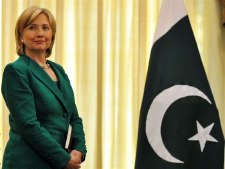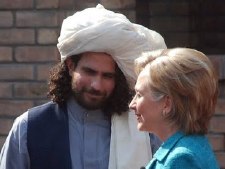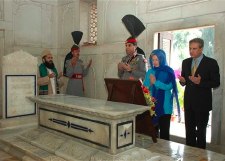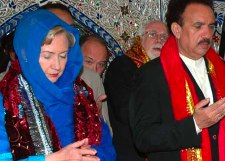I conducted an interview with Secretary of State Hillary Clinton in Washington, DC about Pakistan and the United States’ relations with the Muslim world, originally published on my blog Watandost.
Hassan Abbas: During your recent visit to Pakistan, you won the hearts of many through your courageous outreach — visiting Badshahi mosque, participating in television talk shows, interacting with students at country’s premier educational institution Government College Lahore, and most importantly going to the mausoleum of Mohammad Iqbal, the poet-philosopher who gave the idea of Pakistan. Even those who are critical of the U.S. policy were appreciative of these gestures and it served an important message to those Pakistani politicians also who are not in touch with masses.
What were the signs of hope that you gauged during this visit?
Secretary Clinton: Well, first, the resilience and the courage of the Pakistani people. Everywhere I went, I met people who are speaking out and standing up and working hard, and that was extremely moving to me. I also felt like both the civilian government and the military leadership understood that the threat they faced had to be addressed.
And I thought that was very promising, because the terrorist threat to Pakistanis growing and it’s intense and it can only be defeated by the Pakistani people coming together and rejecting it, in the first instance, trying to present a different narrative than the one that the terrorists are putting forth, using military force where they must, but mostly by developing the democratic institutions, by developing the country, clearly demonstrating that Pakistan has no room for those who want to tear down, because the Pakistan people want to build.
Hassan Abbas: During the said trip you also visited police offices in Islamabad to pay tribute to the sacrifices rendered by police officials in the fight against extremism. You are the first and so far the only foreign leader visiting Pakistan who thought of this. It is becoming clear in Pakistan that the country will not be able to win this battle especially in areas like Punjab and Karachi unless its law enforcement and police forces are reformed and upgraded. I must confess that this topic is of special interest to me as before my academic career in the U.S., I was a police official in Pakistan. Also Pakistan army cannot be expected to fight everywhere in the country. In this context, will the U.S. be supporting police and law enforcement reform agenda in Pakistan?
Secretary Clinton: Well, we would be honored to do so, because I agree with you that the police truly are on the front lines. They often have to deal with the rush of violence that comes in cities or towns and they don’t have the support they need, they don’t often have the equipment that they need. And as you say, I met a number of police officers, both in Lahore and in Islamabad, who are very committed, but under-resourced. And I am more than happy to consider any request from the Pakistani Government to help the police force, because I agree completely that they’re the front line of defense.
Hassan Abbas: Thank you very much. I am sure this would make a headline in Pakistan. I have been in touch with many of my former colleagues in the country and during my research on the subject, I found that Pakistan police is one of the very few organizations in the country where there is an internal institutional effort for reform. I hope your message of support in this sphere will be welcomed and appreciated in Pakistan.
My next question is about U.S. relations with the Muslim world. This U.S. administration has certainly set a new tone of dialogue, reconciliation and respect in this realm. President Obama’s speeches in Turkey and Cairo were absolutely great and gave the right message to the Muslim audiences around the world. What is the follow-up on that? What are the next stages of that relationship?
Secretary Clinton: Well, it’s a great question because we’ve been working very hard on follow-up, and I recently attended a conference in Marrakesh, Morocco where we announced a number of follow-up actions. The one that was just embraced wholeheartedly was the idea of science envoys. I said at the time that much of the science that we take for granted today was really discovered and refined in prior times by Islamic scholars and scientists. And from astronomy to algebra, there’s so much that we owe to the Muslim world, and there needs now to be a renewed emphasis on science, which is not incompatible with religion, and therefore, we’re going to be sending Nobel science prize winners, former heads of the National Academy of Sciences, and so many others to visit universities and governments to try to rekindle that with our help.
We’re also investing in more English language education programs. We’re investing in more business programs, entrepreneurship programs. We’re going to start a series of interfaith dialogues. There will be a lot of follow-up to Cairo because we have had such demand and we’re going to try to meet it.
Hassan Abbas: You are known for your cordial relationship with Pakistani diaspora in the U.S. There is a large Muslim diaspora in the U.S. which I believe can act as a bridge between the U.S. and the Muslim world. Which are the other Muslim diaspora groups in the U.S. that you feel encouraged about and which can play a positive role?
Secretary Clinton: That’s a great question. Well, I do believe that the Palestinian diaspora has been galvanized around economic development. A number of my Palestinian American friends are making investments in the West Bank because the security has improved so much, thanks to the good work of President Abbas and Prime Minister Fayyad. So there is a rather dramatic increase in the economic activity in the West Bank which many American Palestinians are investing in.
There are a number of Indian Muslims who are very involved in interfaith and other outreach activities. I do a lot of work with the Bangladeshi community, which is not as involved as the Pakistani community has been in academia or in professional activity, but is really at the grassroots in a lot of countries — or a lot of cities in our country. So I think those are some examples of what we’re working on.
Hassan Abbas: My last question is about India-Pakistan relations. The United States has said many times that it would like to facilitate better India-Pakistan relations and I think there’s no doubt about the sincerity of that purpose. But of course, U.S. has its limitations in terms of how much it can do to bring both parties on the table and perhaps India is not very comfortable with the idea of third party mediation because of its stature, and reasons of history. However, President Obama made an interesting statement on the subject during his recent visit to China. European Union also is interested in playing a role in this arena.
Do you think there might be some possibility in future that E.U., China, and United States altogether can take an initiative to bring Pakistan and India together and help them resolve their differences. We continuously hear that peace in the Af-Pak region is considered the most critical issue for the global security concerns. A global approach hence can be relevant. Do you think such an international effort can work?
Secretary Clinton: I think it could be a guarantor or it could be a positive force for implementation. But I think that the impetus must come from the two countries themselves. And at some point, both countries might say we’ve gotten as far as we can get; therefore we need some support, we need some new energy. But we have to start with the two countries and with their commitment to pursuing this dialogue first.
More commentary and thoughts on my blog Watandost.

























































Hassan’s observation that Hillary’s passion for Pakistan is palpable is probably true but it is also a fact that US has a certain degree of arrogance when it looks at the global issues.
Thanks to the interviewer for taking up the issue of regional dynamics in South Asia if Afghanistan has to be rescued. I think that is the most important point of the interview.
Overall B+ for the interview but A for the commentary/notes at the end.
the international image of Pakistan can be improved if the peace loving middle class majority speaks out through media. This will in turn attract investors and also rotate the industry wheel. We require to take in confidence other nations to survive and get rid of extremism.
Problem with our Pakistani writers/so called journalists is that they are mostly selfish ,think less about their country( watan) but more about themselves ,a cheapish approach
I agree that this is not a very good interview and sounds naive and gloating, but I think the personal attacks of Hassan Abbas and calling him a Hussain Haqqani (can their be a greater insult) is unfair.
He is not a professional interviewer so you cannot blame him for a bad interview, but we should not question his integrity.
I do not like the Taliban at all. And I think the US is doing many things right and so is Hillary Clinton. But this interview is really propaganda as others have said. And teh language is fawning all over.
Not even a question about drones or about KLB in a serious way… throw her a soft ball if you want, but at least let her respond to those issues even if in her own way. But to not even raise these hot button issues just makes one loose all credibility.